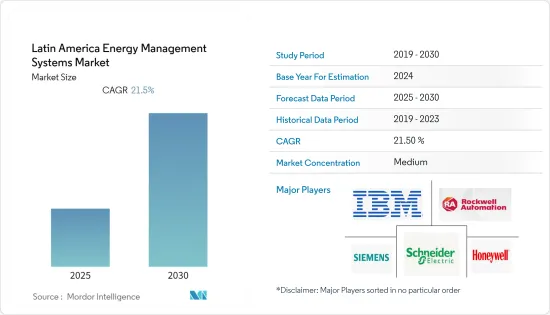
|
시장보고서
상품코드
1640374
라틴아메리카의 에너지 관리 시스템 : 시장 점유율 분석, 산업 동향과 통계, 성장 예측(2025-2030년)Latin America Energy Management Systems - Market Share Analysis, Industry Trends & Statistics, Growth Forecasts (2025 - 2030) |
||||||
라틴아메리카의 에너지 관리 시스템 시장은 예측 기간 동안 21.5%의 연평균 복합 성장률(CAGR)을 나타낼 것으로 예상됩니다.

미세 신호 분석과 같은 EMS의 최신 기술 개발로 에너지 효율적인 시스템 증가와 탄소 발자국 감소가 진행되고 있습니다. 또한 IBM Corporation, Honeywell International Inc, Schneider Electric 등의 기업들은 데이터를 효율적으로 모니터링하기 위해 데이터 분석 소프트웨어를 기존 EMS 모듈에 통합하고 있으며 또한 기업이 적절한 솔루션을 구성하고 공급할 수 있도록 분야별 EMS 소프트웨어 플랫폼을 구축하고 출시하고 있습니다. 따라서 이들 기업은 라틴아메리카의 EMS 업계에서 신제품의 확장성을 높일 가능성이 높습니다.
이 업계를 견인하는 것은 스마트 그리드와 스마트 미터의 보급입니다. 에너지 소비가 증가하고 전력 인프라가 노후화됨에 따라 세계 각국의 정부는 에너지 인프라를 현대화하기 위해 스마트 그리드 기술에 점점 주목하고 있습니다. 많은 정부들이 전력망의 현대화에 나서고 있는 가운데 에너지 효율화 솔루션 시장은 확대되고 있습니다.
유엔의 예측에 따르면 라틴아메리카와 카리브해 국가의 인구는 2050년까지 7억 5,000만 명을 넘어 현재보다 16% 증가합니다. 2021년 1월, IAEA와 국제 전문가들은 워크숍을 개최하여 MAED와 IAEA의 서로 다른 에너지 모델링 툴이 이 지역의 에너지 수요 증가를 예측하고 이에 대비하기 위해 수요 시나리오를 분석하고 적절한 계획을 세우는 데 어떻게 사용할 수 있는지 설명했습니다.
최근 COVID-19 팬데믹으로 인해 세계 가정용 전력 부문은 상당한 증가를 경험했습니다. 이와는 대조적으로 2020년 1분기 산업용 에너지 소비는 극적으로 감소했습니다. Wind Europe의 CEO에 따르면, 동사는 COVID-19 팬데믹에 의한 신규 풍력 발전 프로젝트의 지연을 예상하고, 그 결과 개발자는 각국의 경매 시스템에서의 배포 시기를 놓쳐서 금전적인 페널티를 입을 가능성이 있다고 합니다.
라틴아메리카 에너지 관리 시스템 시장 동향
브라질이 EMS 시장에서 큰 점유율을 차지
브라질 정부는 스마트 그리드 개발을 위해 약 2억 달러의 자금을 투자할 것을 발표했습니다. 또한 2021년까지 국가 전체에 스마트 미터를 배치할 계획도 발표했습니다. 앞서 언급한 요인은 브라질의 신재생에너지 발전에 대한 강한 동력과 함께 브라질의 스마트 가스 미터 시장을 견인할 것으로 예상됩니다.
브라질에서는 천연가스에 대한 요구가 높아지고 파이프라인 건설이 진행되고 있기 때문에 유틸리티부문은 현재 사물인터넷의 장점을 활용하여 다양한 사업에서 스마트 가스미터의 도입을 진행하고 있습니다. 스마트 가스 미터 시스템은 가장 바람직한 옵션이 되어 현재는 정확한 청구, 실시간 데이터 감시, 고객 서비스의 향상을 실현하고 있습니다.
스마트 가스 미터 시장은 브라질의 스마트 미터 업계 전체에 유리한 분야로 작용하고 있으며 최근에는 이 지역의 바이오연료와 천연가스 부문 전체에 대한 견고한 제품 전개에 의해 사상 최대의 이익을 가져왔습니다. 또한 스마트 가스 미터는 현재 상파울루, 리오데자네이루, 파라나, 아마조나스 등 브라질의 6개 주에 도입되고 있으며, 현지 공급자가 참여하고 있기 때문에 시장 성장을 가속하고 있습니다.
Enel은 진출 지역에서 스마트 시티 실적을 쌓아 왔습니다. 브라질의 300개의 행정구역으로 구성된 Rede Cidade Digital과 같이 라틴아메리카 전체의 스마트 시티 프로젝트 중 일부는 대중에게 광대역을 제공하기 위해 노력하고 있습니다.
라틴아메리카에서 높아지는 에너지 효율화 동향
라틴아메리카는 스마트 에너지의 세계화를 위한 거대한 잠재 시장입니다. Smart Energy International Projections에 따르면 2029년까지 이 지역에는 8,500만 대 이상의 스마트 미터가 도입됩니다. 브라질, 아르헨티나, 멕시코, 콜롬비아, 칠레, 페루 등의 국가들이 선두를 달리고 있으며, 지금까지 수백만대의 스마트 미터가 배치된 것으로 보입니다. 중요한 것은 스마트 그리드의 혜택이 에너지 공급의 효율성과 신뢰성을 크게 향상시키고 모든 사람들에게 공정하게 에너지를 분배한다는 점입니다.
동시에 이 지역이 직면하는 독특한 과제도 있습니다. 지역 에너지 중개, 분산 발전 및 저장, 마이크로그리드, 전기자동차도 LATAM 지역에 큰 기회를 제공합니다. 앞서 언급한 문제에 대처하는 기술에 대한 투자는 이러한 진보를 포함하는 스마트 에너지 이행의 기반이 됩니다.
이 지역에서는 도시화와 경제 성장이 진행됨에 따라 에너지 서비스와 인프라에 대한 요구가 커지고 있습니다. 그 결과, 이 지역의 마을은 도시계획의 초기 단계부터 기존의 인프라를 확장할 때에도 재생 가능 에너지를 통합할 수 있는 옵션을 가지고 있어 현지에서 이용 가능한 대규모 재생 가능 자원을 활용할 수 있게 되었습니다. 예를 들어, 인구 약 680만 명의 산티아고 데 칠레는 라틴아메리카의 주요 도시 중 하나로 이 지역의 에너지 혁명을 추진하고 있습니다. 이 도시는 대중 교통에 전기 버스를 도입하도록 강력하게 추진하고 있습니다.
라틴아메리카 에너지 관리 시스템 산업 개요
에너지 관리 시스템 시장은 경쟁이 치열하며 여러 대형 기업들이 진입하고 있습니다. 그러나 시장 점유율의 관점에서 보면 현재 시장을 독점하는 대기업은 소수입니다. 이 시장에서 압도적인 점유율을 자랑하는 선도 기업들은 해외의 고객 기반 확대에 주력하고 있습니다. 이러한 기업들은 시장 점유율과 수익성을 높이기 위해 전략적 공동 이니셔티브를 활용합니다. 주요 기업은 IBM Corporation 및 Rockwell Automation Inc.입니다. 최근 시장 개척 동향은 다음과 같습니다.
- 2021년 6월 로크웰 오토메이션은 IoT 기술과 업계 전문 지식을 통합하고 제조 공정에서 가장 중요한 공기, 물, 가스, 전기, 증기 등의 다양한 유틸리티를 관리하기 위해 유의미하고 실용적인 실시간 데이터를 제공하는 에너지 관리 플랫폼 솔루션을 구축했습니다.
- 2021년 1월 탈탄소화 및 사물인공지능(AIoT) 기술의 세계적 선구자인 Envision Digital International Pte Ltd와 IBM은 지속 가능한 에너지 관리 솔루션을 창출하기 위한 제휴를 발표했습니다. 이 파트너십을 통해 세계 기업과 정부가 디지털 전환을 진행하면서 비즈니스 목표 달성 및 에너지 효율 목표 달성을 이루도록 지원합니다.
기타 혜택
- 엑셀 형식 시장 예측(ME) 시트
- 3개월간의 애널리스트 지원
목차
제1장 서론
- 조사의 전제조건과 시장 정의
- 조사 범위
제2장 조사 방법
제3장 주요 요약
제4장 시장 인사이트
- 시장 개요
- 밸류체인/서플라이체인 분석
- 업계의 매력도 - Porter's Five Forces 분석
- 신규 진입업자의 위협
- 구매자의 협상력
- 공급기업의 협상력
- 대체품의 위협
- 경쟁 기업간 경쟁 관계의 강도
- COVID-19의 업계에 대한 영향 평가
제5장 시장 역학
- 촉진요인
- 스마트 그리드와 스마트 미터 이용 증가
- 에너지 효율화 투자 증가
- 억제요인
- 높은 초기 도입 비용과 유지 보수 비용
제6장 시장 세분화
- 컴포넌트별
- 하드웨어
- 소프트웨어
- 서비스
- 유형별
- HEMS
- BEMS
- IEMS
- 최종 사용자별
- 제조업
- 전력 및 에너지
- IT 및 통신
- 헬스케어
- 기타 최종 사용자
- 지역별
- 브라질
- 아르헨티나
- 기타 라틴아메리카
제7장 경쟁 구도
- 기업 프로파일
- IBM Corporation
- Rockwell Automation Inc.
- General Electric Co.
- Schneider Electric SE
- Cisco Systems Inc.
- Tendril Networks Inc.
- Eaton Corporation
- EnerNOC Inc.
- Elster Group GmbH
- SAP SE
- Siemens AG
- Honeywell International Inc.
제8장 투자 분석
제9장 시장의 미래
CSM 25.02.17The Latin America Energy Management Systems Market is expected to register a CAGR of 21.5% during the forecast period.

There has been a rise in energy-efficient systems and a reduction in carbon footprint due to developments in the newest technologies in EMS, such as tiny signal analysis. Furthermore, firms like IBM Corporation, Honeywell International Inc., and Schneider Electric have incorporated data analytics software into their current EMS modules to monitor data efficiently. These companies have also created and launched sector-specific EMS software platforms to help businesses regulate and supply adequate solutions, which is likely to boost the scalability of new products in the Latin American EMS industry.
The industry is being driven by the growing use of smart grids and smart meters. With rising energy consumption and outdated power infrastructure, governments worldwide are increasingly turning to smart grid technologies to modernize their energy infrastructures. The market for energy efficiency solutions is growing as many governments embark on modernization initiatives to modernize their power grids.
According to UN predictions, Latin America and the Caribbean would have over 750 million people by 2050, up by 16% from now. In January 2021, the IAEA and international experts held a workshop to illustrate how MAED and the Agency's other energy modeling tools may be used to analyze demand scenarios and plan appropriately to help foresee and prepare for the region's expanding energy need.
Because of the recent COVID-19 pandemic, the worldwide residential power sector experienced a considerable increase due to quarantines. In contrast, industrial energy consumption fell dramatically in the first quarter of 2020. According to the CEO of Wind Europe, the firm expects delays in new wind farm projects due to the COVID-19 pandemic, which may force developers to miss deployment dates in nations' auction systems and suffer financial penalties as a result.
Latin America Energy Management Systems Market Trends
Brazil to Hold a Major Share in the EMS Market
The Brazilian government announced funding of around USD 200 million to develop smart grids. It also announced plans to deploy smart meters in the entire country by 2021. The aforementioned factors, coupled with Brazil's strong focus on renewable energy generation, are expected to drive the Brazilian smart gas meter market.
With the growing need for natural gas and the construction of pipelines in Brazil, the utility sector is now leveraging the benefits of the Internet of Things to bring about smart gas meters in various businesses. Smart gas metering systems have become the most desirable option, and they are now providing billing accuracy, real-time data monitoring, and improved customer service.
The smart gas meter market acts as a lucrative vertical for the overall smart metering industry in Brazil, and it was recently bestowed with unprecedented gains driven by robust product deployment across the biofuel and natural gas sectors in the region. Besides, the smart gas metering concept is now present in six Brazilian states, including Sao Paulo, Rio de Janeiro, Parana, and the Amazonas, involving local providers and consequently boosting the market growth.
Enel accomplished a significant smart city track record in its areas of presence. Some smart city projects across the Latin American region have strived to make broadband accessible to the public, such as Brazil's Rede Cidade Digital, which comprises 300 municipalities.
Increasing Trends Toward Energy Efficiency in Latin America
Latin America is a huge potential market for smart energy globalization. According to the Smart Energy International Projections, by 2029, the area would have deployed over 85 million smart meters. Countries like Brazil, Argentina, Mexico, Colombia, Chile, and Peru are leading the way and will have deployed millions of smart meters by then. Importantly, it is a location where the smart grid's benefits can result in significant increases in energy supply efficiency and reliability, as well as a fair distribution of energy to all.
At the same time, there are unique obstacles that this region faces. Local energy brokering, distributed generation and storage, micro-grids, and electric vehicles also present significant opportunities for LATAM. Investments in technology that address the problems raised above can also serve as the foundation and enablers for a smart energy transition that incorporates these advances.
With increased urbanization and economic growth in the region, there is a greater need for energy services and infrastructure. As a result, towns in the region have the option to integrate renewable energy from the start of the urban planning process and in the extension of existing infrastructure, allowing them to make use of the large renewable resources accessible locally. For example, Santiago de Chile, with a population of around 6.8 million people, is one of the main cities in Latin America, pushing the region's energy revolution. The city has pushed hard for electric buses to be included in its public transportation system.
Latin America Energy Management Systems Industry Overview
The energy management systems market is competitive and consists of several major players. However, in terms of market share, few of the major players currently dominate the market. With a prominent share in the market, these market players are focusing on expanding their customer bases across foreign countries. These companies are leveraging strategic collaborative initiatives to increase their market shares and profitability. The key players are IBM Corporation and Rockwell Automation Inc. Recent developments in the market are -
- June 2021: Rockwell Automation integrated IoT technology with industry expertise to build an energy management platform solution that gives meaningful, actionable real-time data to manage a variety of the manufacturing processes' most important utilities. Air, water, gas, electricity, and steam are all examples of this.
- January 2021: Envision Digital International Pte Ltd, a global pioneer in decarbonization and Artificial Intelligence of Things (AIoT) technologies, and IBM announced a partnership to create sustainable energy management solutions. The partnership will assist businesses and governments throughout the world in achieving business objectives and meeting energy efficiency targets while advancing on their digital transformation journeys.
Additional Benefits:
- The market estimate (ME) sheet in Excel format
- 3 months of analyst support
TABLE OF CONTENTS
1 INTRODUCTION
- 1.1 Study Assumptions and Market Definition
- 1.2 Scope of the Study
2 RESEARCH METHODOLOGY
3 EXECUTIVE SUMMARY
4 MARKET INSIGHTS
- 4.1 Market Overview
- 4.2 Value Chain/Supply Chain Analysis
- 4.3 Industry Attractiveness - Porter's Five Forces Analysis
- 4.3.1 Threat of New Entrants
- 4.3.2 Bargaining Power of Buyers
- 4.3.3 Bargaining Power of Suppliers
- 4.3.4 Threat of Substitute Products
- 4.3.5 Intensity of Competitive Rivalry
- 4.4 Assessment of the COVID-19 Impact on the Industry
5 MARKET DYNAMICS
- 5.1 Market Drivers
- 5.1.1 Increasing Usage of Smart Grids and Smart Meters
- 5.1.2 Rising Investments in Energy Efficiency
- 5.2 Market Restraints
- 5.2.1 High Initial Installation Costs Coupled with Maintenance Costs
6 MARKET SEGMENTATION
- 6.1 Component
- 6.1.1 Hardware
- 6.1.2 Software
- 6.1.3 Services
- 6.2 Type
- 6.2.1 HEMS
- 6.2.2 BEMS
- 6.2.3 IEMS
- 6.3 End User
- 6.3.1 Manufacturing
- 6.3.2 Power and Energy
- 6.3.3 IT and Telecommunication
- 6.3.4 Healthcare
- 6.3.5 Other End Users
- 6.4 Geography
- 6.4.1 Brazil
- 6.4.2 Argentina
- 6.4.3 Rest of Latin America
7 COMPETITIVE LANDSCAPE
- 7.1 Company Profiles
- 7.1.1 IBM Corporation
- 7.1.2 Rockwell Automation Inc.
- 7.1.3 General Electric Co.
- 7.1.4 Schneider Electric SE
- 7.1.5 Cisco Systems Inc.
- 7.1.6 Tendril Networks Inc.
- 7.1.7 Eaton Corporation
- 7.1.8 EnerNOC Inc.
- 7.1.9 Elster Group GmbH
- 7.1.10 SAP SE
- 7.1.11 Siemens AG
- 7.1.12 Honeywell International Inc.



















